Aug 27, 2017
"Coco" director Lee Unkrich does not understand why some people are "threatened" by his film
Corporations and culture mix about as well as oil and water, which is something that Pixar director Lee Unkrich, the director of Pixar's upcoming Coco, is learning the hard way.
The film editor-turned-director took to Twitter last night to ask a question that's apparently been bugging him (Update: Unkrich deleted the tweet after we published this story, so a screenshot of the tweet is shown below):
Disney-Pixar directors are notoriously tight-lipped about their personal feelings and shy about controversy prior to a film's release, so it is nothing short of remarkable that Unkrich is asking his followers on Twitter why his film is being compared unfavorably to an animated film that was released three years earlier.
His question elicited dozens of responses, with Twitter users offering numerous theories:
The question even garnered a response from The Book of Life director Jorge Gutierrez, who is friendly with Unkrich and has expressed support for Coco in the past.
Sadly for Unkrich, the film's reputation may have been irreparably tainted for reasons beyond his control - and by the very people who are paying to make the film: the Walt Disney Company.
Disney's remarkable misstep happened in 2013 when overzealous Disney lawyers filed an application with the U.S. Patent and Trademark Office to trademark “Día de los Muertos” (Day of the Dead), in an attempt to control the sales of Day of the Dead products related to “education and entertainment services,” “fruit preserves; fruit-based snack foods,” “toys, games and playthings,” “clothing,” “footwear,” “backpacks,” and “clocks and jewelry.”
Even after Disney withdrew the trademark application, many Mexicans continued to view the project with skepticism - a shady attempt by gringos to plunder their country's cultural and religious holiday for profit. The Disney marketing machine has been working overtime ever since trying to reverse the public relations nightmare, going so far as to hire one of its harshest Mexican-American critics as a consultant on Coco.
Disney has even crafted a marketing plan aimed at Mexican and Latin audiences that diminishes Unkrich's own involvement, while hyping the contributions of the Latinx artists who contributed to Coco's production. Early publicity in Mexican and Latin media, like this recent piece, doesn't even mention Unkrich in the body of the text, instead focusing on the film's Mexican-American co-director Adrian Molina and interviewing other Mexican artists who worked on the film, like Alonso Martinez.
Disney's trademark attempt was “a mistake that happened and we regretted it immediately,” Unkrich told the LA Times earlier this year, further adding in an interview with Vanity Fair that it was “personally devastating.”
In a final attempt to mollify Mexican audiences, Disney is launching the film in Mexico prior to its U.S. release on November 22. Coco will world premiere at Mexico's Festival Internacional de Cine de Morelia on October 20, 2017, followed by a nationwide Mexican release on October 27, in time for the Día de Muertos holiday.
Looking at it through this lens, the grassroots support for The Book of Life over Coco may simply be another manifestation of people's resentment toward Disney about their attempt to trademark a Mexican holiday, as well as lingering questions about Disney's motives for making such a film in the first place.
Compare this situation to Dreamworks, which was able to create a franchise like Kung Fu Panda, and have it be a huge success in both the U.S. and abroad, including China, where the film is set. In fact, the franchise was so popular with Chinese moviegoers that it angered that country's government officials, prompting them to question why an American film that dabbled on the edges of Chinese culture was more successful than actual Chinese films made by Chinese people about Chinese culture-
Further, Kung Fu Panda didn't suffer any of Coco's scrutiny or criticisms for cultural authenticity. In fact, Mark Osborne, co-director of the original Kung Fu Panda, joked not so long ago that to research the film, “we just Googled China.”
The difference might be that Kung Fu Panda was simply a film set in China, while Disney-Pixar's Coco cannot escape the seeming perception that it will be the definitive animated film about Mexico. A big part of that perception may have to do with the film's focus on such an intensely personal, family-oriented holiday like Day of the Dead.
Had Pixar decided to make a film that starred Mexican characters without the trappings of Día de Muertos, there would have likely been little controversy, but the studio has hinged the entire success of its film on being an authentic representation of Mexican families celebrating a sacred holiday, something that a non-Mexican director would have been wise to avoid attempting.
It's led to a cycle that may prove unwinnable for Disney, where Unkrich is struggling to convince viewers of his intentions and openly questioning why people don't like his film. He has even gone so far as to describe the film as a “a love letter to Mexico.” The question remains though whether Mexico will love him back.




Post your comment